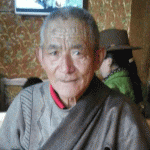Two elderly Tibetans, Tashi Tsering and Uyak Tulku Lobsang Tenzin, were arrested by Chinese authorities early this month, after advising people to follow His Holiness the Dalai Lama’s advice not to follow the controversial Shugden practice. The two were sentenced to eighteen months and ten years respectively.
The Dalai Lama has advised his followers against Shugden, or Dolgyal, since 1975, amid concerns that the practice may encourage sectarianism and undermine the unity of the Tibetan people. Most Tibetans choose to follow His Holiness’s guidance, which can be found on his website www.dalailama.com:
Following long and careful investigations, His Holiness the Dalai Lama strongly discourages Tibetan Buddhists from propitiating the fierce spirit known as Dolgyal (Shugden). Although he once practised Dolgyal propitiation himself, His Holiness renounced the practice in 1975 after discovering the profound historical, social and religious problems associated with it. Historical investigation reveals that Dolgyal practice, which has strong sectarian overtones, has a history of contributing to a climate of sectarian disharmony in various parts of Tibet, and between various Tibetan communities. Therefore, from 1975 onwards, His Holiness has regularly made public his view that this practice is inadvisable.
It appears from these arrests that the Chinese authorities in Tibet are using his advice as a divisive tactic and an excuse to arrest people. Columbia University Tibet scholar Robbie Barnett told Radio Free Asia reporters that in April this year, police in Tashi Tsering’s home prefecture, Chamdo, issued regulations criminalising “anyone using the protector ‘Gyalchen Shugden’ to create differences among the believing masses”. The wording of the regulations appears to be “aimed primarily at opponents or critics of the Shugden practice,” he said.
There is a Shugden base in London, UK and His Holiness’ visits to the west frequently attract protests by certain Shugden factions, with many suspicous of Chinese involvement in the agitations.
A source from within Tibet told RFA reporters that Tashi Tsering stood by his actions despite the legal action against him. “Tsering says he has done nothing wrong and has no regrets. His only concern is for his wife, who is 86 and was left behind in [the regional capital] Lhasa after he was detained,” the source said.





 Print
Print Email
Email